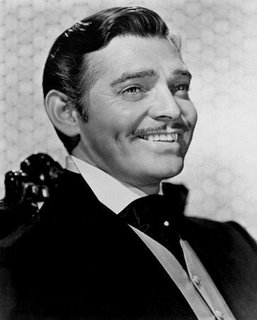
Cinema’s undisputed 'king' was a man of personal conviction
by Nick Zegarac
“The things a man has to have are hope and confidence in himself against odds, and sometimes he needs somebody, his pal or his mother or his wife or God, to give him that confidence. He's got to have some inner standards worth fighting for or there won't be any way to bring him into conflict. And he must be ready to choose death before dishonor without making too much song and dance about it. That's all there is to it.” – Clark Gable
 Of his enduring on camera charisma and animal magnetism, it has been said of Clark Gable that he was “a man’s man, lusting after life and women.” But this snap analysis of Gable is an over-simplification of both the man and the legend. For no man who could spank Joan Crawford (Dancing Lady), rape Scarlett O’Hara (Gone With The Wind), give Norma Shearer the back of his hand (The Divorcee) - and be forgiven, not only by the ladies but his adoring fans as well - is quite so one-dimensional. And, even if he seemed to relish the moniker of a rapscallion on the screen, backstage the stigma of playing a he-man often got under his skin. “Hell,” he once openly mused, “If I'd jumped on all the dames I'm supposed to have jumped on, I'd have had no time to go fishing.”
Of his enduring on camera charisma and animal magnetism, it has been said of Clark Gable that he was “a man’s man, lusting after life and women.” But this snap analysis of Gable is an over-simplification of both the man and the legend. For no man who could spank Joan Crawford (Dancing Lady), rape Scarlett O’Hara (Gone With The Wind), give Norma Shearer the back of his hand (The Divorcee) - and be forgiven, not only by the ladies but his adoring fans as well - is quite so one-dimensional. And, even if he seemed to relish the moniker of a rapscallion on the screen, backstage the stigma of playing a he-man often got under his skin. “Hell,” he once openly mused, “If I'd jumped on all the dames I'm supposed to have jumped on, I'd have had no time to go fishing.”On screen in the 1930s, there was no male star to rival Gable’s rugged penchant for hard-hitting, straight-shooting manliness.
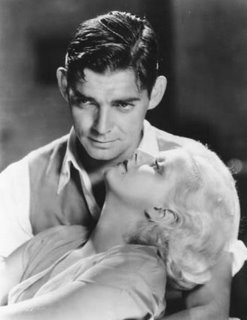 He was proud, arrogant and pumped full of self-assuredness between those broad squared off shoulders. Yet, in moments of peril, when it seemed as though everything including the girl was lost to him, that rough and tumble façade would suddenly and miraculously melt away; resonating an emotional throb that revealed the panged tempo of a broken heart.
He was proud, arrogant and pumped full of self-assuredness between those broad squared off shoulders. Yet, in moments of peril, when it seemed as though everything including the girl was lost to him, that rough and tumble façade would suddenly and miraculously melt away; resonating an emotional throb that revealed the panged tempo of a broken heart.While professional criticism persists about his acting prowess - that Gable never played anyone but Gable - in private ‘the king’ was void of that flash and pomp that accompanied his screen presence. At parties he could readily be discovered in congenial banter with the hired help or chauffeurs. His menagerie of close friends from the acting profession was hand-picked more for their introspection and sensitivity than fair weather camaraderie.
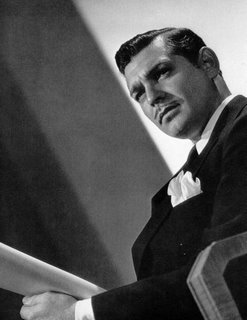 Even Gable’s wives (Josephine, Maria, Carol, Sylvia and Kathleen) were reserved choices in soul mates that sadly, proved much too good to last. In retrospect both Jo’ and Maria are often misconstrued by biographers as mere stepping stones on the road to fame during Gable’s social climbing early years. Of romance in general, Gable himself once mused, “It is an extra dividend when you like the girl you've fallen in love with,” and to be sure, Gable genuinely adored his third wife; the gifted madcap - Carol Lombard.
Even Gable’s wives (Josephine, Maria, Carol, Sylvia and Kathleen) were reserved choices in soul mates that sadly, proved much too good to last. In retrospect both Jo’ and Maria are often misconstrued by biographers as mere stepping stones on the road to fame during Gable’s social climbing early years. Of romance in general, Gable himself once mused, “It is an extra dividend when you like the girl you've fallen in love with,” and to be sure, Gable genuinely adored his third wife; the gifted madcap - Carol Lombard.Her untimely death in a plane crash (at the age of 33) - transformed Gable’s legacy from the movies undisputed ‘king’ to everybody’s favorite war hero. But it also forever altered the viral chemistry that made him larger than life on the screen. The galvanic quality of ‘a little boy’ enveloped in a masculine body had evaporated with Lombard’s demise.
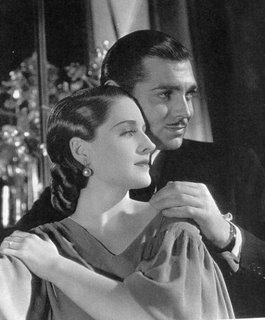 Yet, where a lesser man might have sunken into sullen bitterness or deep depression, drenching himself in the medicated numbness of alcohol or prescription drugs, Gable transformed his angst into a very public cause. He joined the Armed Forces and served on the front lines during WWII.
Yet, where a lesser man might have sunken into sullen bitterness or deep depression, drenching himself in the medicated numbness of alcohol or prescription drugs, Gable transformed his angst into a very public cause. He joined the Armed Forces and served on the front lines during WWII.His return to Hollywood after those terrible years of conflict was a forgone conclusion. But the world had changed while he had been away – and Hollywood was certainly not the same town by the end of the 1940s. Gable’s popularity – once seemingly so secure, was never quite as resilient afterwards. Attempts at ‘being himself’ opposite Greer Garson, Doris Day, Sophia Loren, and even Marilyn Monroe strangely lacked that spark that had made him a phenomenon at the box office only a decade earlier. The legend had passed its prime.
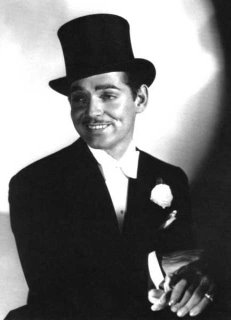
Yet the enduring magnitude of Gable’s film legacy has been remarkably well preserved. In fact, in the end Clark Gable was very much like the characters he played; a bundle of passion, fear, elation and pity; the very embodiment of lusty excellence in the male animal; living life to its fullest without intruding on anyone’s happiness to sustain his own. It was a charmed design for a very pragmatic lifestyle, marred by only one genuine note of regretful sadness; that he did not live to see the birth of his only son who today bears his namesake.
In retrospect then, Clark Gable - the legend, was not simply a “man’s man”, but a true renaissance guy. He best thrives today in those flickering reminders of Rhett Butler and Fletcher Christian; inside heady thoughts spawned by female daydreamers who continue to “frankly, my dear…give a damn.”
No comments:
Post a Comment